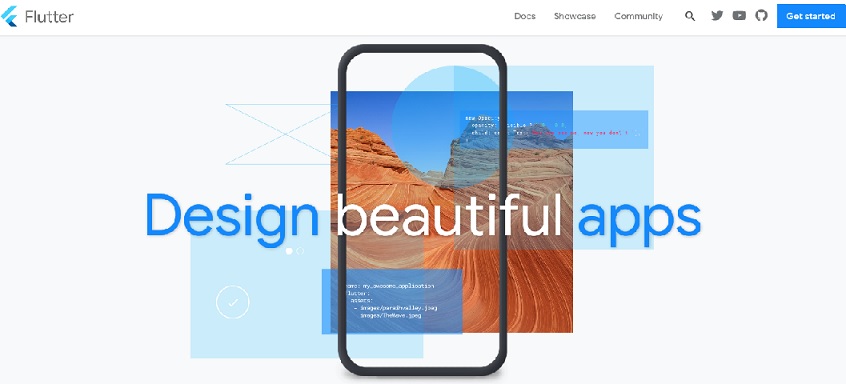
It is no longer an option to get a Smartphone, but it has become a requirement in today’s era. Mobile phones have become an indistinguishable component in our everyday lives. It starts with Waking up with an alarm, checking messages, listening to music, watching videos, playing games, reviewing emails, updating status, and many more. It all runs smoothly from mobile applications on our mobile phones. If we speak about the Smartphone industry, almost one decade has gone by. The use of mobile applications is growing after each passing day. As per the reports, application downloads are expected to rise to 352 billion by the year 2021, though we can note the never-ending rivalry with this tremendous increase in mobile applications development. There’ll be about 7 billion mobile users in the year 2021, as well as an aggregate of 90% of the time is assumed to be spent on mobile applications.
Indeed, always remember that it’s not relatively as easy to achieve business success via a mobile application as coming out with the million-dollar idea of a mobile app. Consequently, as the number of applications being released in different app stores, competition often rises and makes it difficult for startups to thrive in the market. One of the critical reasons, other than experience, is Technology plays a crucial role that can turn an average application concept into a million-dollar accomplishment. Recognizing Technology could be a hit on is simple when it comes to an expert software development process, but it’s difficult for a startup to select the most suitable Technology. Don’t worry; we are making this task easier. Thus, In this blog, we’ll be looking at a few of the best technologies for startups to build mobile applications in the year 2021.
So without any further ado, let’s get started.
Why are Mobile Applications gaining so much Traction?
 According to a new study by Statista, in the second quarter of 2020, approximately 28 billion times applications were downloaded from Google Play, and over 9.1 million applications were downloaded from the Apple App Store. Through this stat, you will get a strong idea that the Play Store and App Store have countless mobile applications. A new mobile application is released every instant, which outdates the current ones and supersedes mobile apps’ development sector.
According to a new study by Statista, in the second quarter of 2020, approximately 28 billion times applications were downloaded from Google Play, and over 9.1 million applications were downloaded from the Apple App Store. Through this stat, you will get a strong idea that the Play Store and App Store have countless mobile applications. A new mobile application is released every instant, which outdates the current ones and supersedes mobile apps’ development sector.
Well, still in doubt? Have a look at these market stats:
- The reports predict that, on average, a user install 20-30 apps and spends over 3 hours a day on mobile apps.
- As per the source, by the year 2022, the app store spending is predicted to rise by 92% to 157 billion dollars globally.
- Over 87% of users check their phones in one hour.
- On record, over 100K apps were launched every month on Google Play.
The application needs to offer something distinct and user-friendly to capture the user’s attention. Then and only then will you expect the users to download your application in the longer term and use it.
Well, here are a few best disruptive technologies for mobile applications that certainly ensure success for startups in 2021.
Top 5 Mobile App Development Technologies
- Flutter.
- Kotlin.
- React.
- Python.
- Java.
Let’s move forward and discuss each Technology in detail, along with their features, apps built using these, and why we think so. So here we go.
1. Flutter
 Flutter is a lightweight UI toolkit to develop natively compiled applications across all devices like mobile, web, and desktop through a single codebase. It employs Dart programming language and integrates Material Design and Cupertino widgets to build a stunning UI which not only feels native but could also mimic the platform to act naturally on every device. It provides an excellent User Interface, faster drafting of code, broad community support, numerous advanced UI alternatives, and plenty more. . Flutter delivers an application that runs with consistency and versatility, quickly and reliably on multiple platforms.
Flutter is a lightweight UI toolkit to develop natively compiled applications across all devices like mobile, web, and desktop through a single codebase. It employs Dart programming language and integrates Material Design and Cupertino widgets to build a stunning UI which not only feels native but could also mimic the platform to act naturally on every device. It provides an excellent User Interface, faster drafting of code, broad community support, numerous advanced UI alternatives, and plenty more. . Flutter delivers an application that runs with consistency and versatility, quickly and reliably on multiple platforms.
Why Flutter?
It’s an open-source and free to use platform. To help the developers with any problems they face, it provides comprehensive documentation and support groups. Flutter gives a universal code that works seamlessly on Android and IOS; you may witness rich UX output in Flutter because there are no limitations. Since widgets are parts of the application instead of the platform, compatibility problems on several Operating Systems are far less widespread.
Features of Flutter
- Comes with tons of widgets like Material Design and Cupertino IOS flavor.
- Has Rich motion APIs.
- Adaptive layouts.
- Promotes portable GPU.
- Less cost.
- Best for MVP development.
Some applications built using Flutter:
- Birch Finance.
- Google Ads.
- Tencent.
- Reflect.
- The New York Times.
2. Kotlin
 Kotlin is a cross-platform, structured-typed programming language with a type interface that was first introduced in 2011. It’s completely interoperable with Java and JVM versions over its standard library centered on Java Class Library. The most major programming language for developing new mobile apps has indeed been Kotlin. For generating legendary mobile applications, Android app developers and startups select Kotlin as their favorite Technology. Using Kotlin, programmers only have to write a few code lines, which is more straightforward than some other programming languages. The reason behind immense popularity and why developers prefer more is that it’s secure, precise, and comprehensive support tools.
Kotlin is a cross-platform, structured-typed programming language with a type interface that was first introduced in 2011. It’s completely interoperable with Java and JVM versions over its standard library centered on Java Class Library. The most major programming language for developing new mobile apps has indeed been Kotlin. For generating legendary mobile applications, Android app developers and startups select Kotlin as their favorite Technology. Using Kotlin, programmers only have to write a few code lines, which is more straightforward than some other programming languages. The reason behind immense popularity and why developers prefer more is that it’s secure, precise, and comprehensive support tools.
Why Kotlin?
App development using Kotlin provides improved and top-notch protection against all odds. Kotlin makes it possible for its developers to draft fewer code lines and have an excellent user experience, resulting in fewer bugs and errors. Kotlin seems to have no latency runtime and has a robust community that draws larger programmers to Kotlin.
Features of Kotlin
- Reduces Crashes in Runtime.
- Immutable.
- Allows Operator Overloading.
- Has Lazy-Loading feature.
- Ensures Null Safety.
Some applications built using Kotlin
- Trello.
- Uber.
- Coursera.
- Evernote.
- Pinterest.
3. React
 Developed by Facebook, it is among the most common JavaScript frameworks that are used in the development of mobile cross-platform applications. It is open-source and helps you to develop applications for platforms like Android and IOS. React decreases the development time and allows you to construct effective, efficient, and reliable apps in much fewer time durations. This will lead to making React the best investment for startups. Without compromising on consistency, it can extend to all future platforms while retaining superior performance. A developer can create cross-platform mobile applications leveraging React to Technology, which looks and sound like native applications.
Developed by Facebook, it is among the most common JavaScript frameworks that are used in the development of mobile cross-platform applications. It is open-source and helps you to develop applications for platforms like Android and IOS. React decreases the development time and allows you to construct effective, efficient, and reliable apps in much fewer time durations. This will lead to making React the best investment for startups. Without compromising on consistency, it can extend to all future platforms while retaining superior performance. A developer can create cross-platform mobile applications leveraging React to Technology, which looks and sound like native applications.
Why React?
React allows plugins to be introduced to be programmers and has a versatile architecture with functional interfaces assisted by customization choices. With React, without thinking much more about the costs, programmers can develop cross-platform. React allows companies to save a lot of time and potential expenses, which is the key reason why companies choose to rely on React. According to Stack Overflow, for the very first time, React has secured a place in the niche of upcoming most dreaded Technology.
Features of React
- Easy Migration.
- Allow Code Reusability.
- Comes with Hot Reload.
- Uses advanced JS.
- Ensure high performance.
Some applications built using React
- Airbnb.
- Instagram.
- Facebook.
- UberEats.
- Discord.
4. Python
 First introduced in 1991, Python would be in the first place in enhanced-secure and fully-fledged mobile app development. Python is a high-level and general-purpose programming language that is broadly used to build mobile applications that are flexible and easy to launch. It’s also a portable language to enable streamlined development while providing GUI programming & community-level support with integrated-in debuggers. Python has become one of the best mobile application development technology that startups and large corporations use to develop rich-quality, stable, and interactive web-based apps in today’s day and age. Python has a convenient and straightforward syntax, which centers on ease of understanding and further minimizes the application’s maintenance cost. It also accepts packages, modules, encourages the modularity of the application and reusability of code.
First introduced in 1991, Python would be in the first place in enhanced-secure and fully-fledged mobile app development. Python is a high-level and general-purpose programming language that is broadly used to build mobile applications that are flexible and easy to launch. It’s also a portable language to enable streamlined development while providing GUI programming & community-level support with integrated-in debuggers. Python has become one of the best mobile application development technology that startups and large corporations use to develop rich-quality, stable, and interactive web-based apps in today’s day and age. Python has a convenient and straightforward syntax, which centers on ease of understanding and further minimizes the application’s maintenance cost. It also accepts packages, modules, encourages the modularity of the application and reusability of code.
Why Python
- Python is efficient, easy to deploy, and helps to build scalable web apps.
- Using fewer codes, Python is simple to learn and fast to create, saving your time, effort, and money.
- Python emphasizes the reusability of code and is flexible, readable, excellently-structured, and legible.
Features of Python
- Massively Portable and Dynamic.
- Extensible and Embeddable.
- Easy Database Connectivity.
- Easily encapsulated with other programming languages.
Some applications built using Python
- Youtube.
- SurveyMonkey.
- DropBox.
- Reddit.
- Instagram.
5. Java
 Introduced in 1995, Java is a favorite language for the building of mobile apps all the time. To build top-notch mobile apps, numerous startups, companies, and developers depend on Java technology. In consideration of its comprehensive documentation and support groups, these technology rankings are on God’s level. Java remains on top of mobile application technologies with the selections of several startups and companies. Java provides a wide variety of open-source libraries and documentation to help programmers create various Android and other apps quickly and easily. You won’t believe, popular framework, namely log4J and TestNG, are developed using Java technology.
Introduced in 1995, Java is a favorite language for the building of mobile apps all the time. To build top-notch mobile apps, numerous startups, companies, and developers depend on Java technology. In consideration of its comprehensive documentation and support groups, these technology rankings are on God’s level. Java remains on top of mobile application technologies with the selections of several startups and companies. Java provides a wide variety of open-source libraries and documentation to help programmers create various Android and other apps quickly and easily. You won’t believe, popular framework, namely log4J and TestNG, are developed using Java technology.
Why Java?
- Has a broader active community.
- Unlike some other equivalents, Java is simple to edit, use, compile, practice, and test programming language. As it utilizes automated allocation of memory, Java is way smoother and more straightforward than C++.
- The principal of OOPs and so on are followed by Java, which allows programmers to generate modes of transmission, modular programs, and reusable codes.
- Java is also labeled as The Official Language to develop Android apps.
Features of Java
- Platform dependent and ensures Multi-Threading.
- Highly secured and better performance.
- Simple and Familiar.
- Dynamic and Extensible.
Some applications built using Java
- Telegram.
- Twitter for Android.
- Spotify.
- Omni-Notes.
- VLC Media Player.
Conclusion
The app development sector is a market that is continually changing and emerging each day with newer technologies and tools for development. Therefore, the technologies mentioned above are now being widely used and are anticipated to remain in the mobile app development domain for a prolonged period. On the other hand, if you’re seeking to develop a feature-rich, stable, and scalable mobile app for your business or startup, then employ the best mobile app development company like us. With years of experience building robust mobile apps, we transform our client’s app idea into a top-notch app that stands out from competitors.
For further information, visit our website www.matellio.com.




